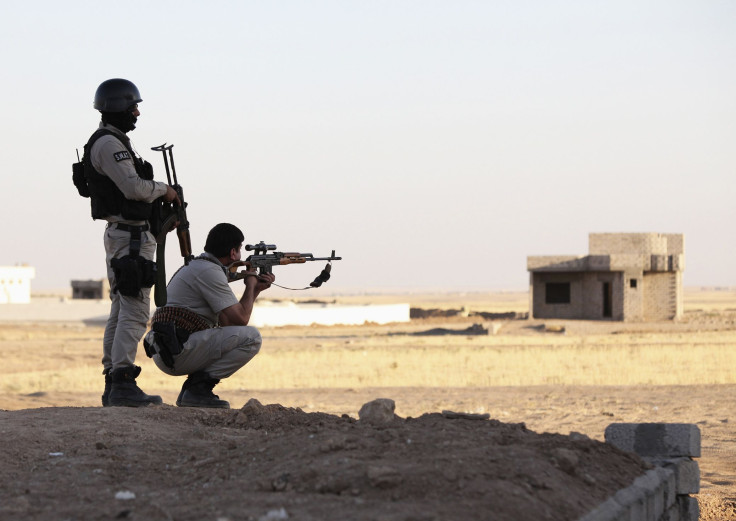The U.S. Is Bombing Iraq And Not Syria For Reasons That Look Really Familiar

There’s more to the story of U.S. airstrikes on Iraq than assisting in a humanitarian crisis. The Obama administration’s motives behind intervention in many ways reflect those behind the Bush administration's 2003 invasion and shed some light onto why President Barack Obama has resisted direct engagement in other ISIS strongholds throughout Iraq and in Syria.
The current airstrikes began Thursday after ISIS seized several towns in Iraq's Kurdistan region and threatened a possible genocide of the Yazidi ethnic minority. Obama announced Monday the Pentagon would supply arms directly to Kurdish forces to fight ISIS, in addition to the weaponry already supplied to them by the CIA. Obama’s motives, both said and unsaid, are strikingly similar to those behind the 2003 invasion in that each decision was made to protect the Kurds, protect U.S. interests and get rid of a threatening sectarian power.
“The Kurdish Peshmerga [Kurdish armed forces] forces are fairly capable,” said Karl Mueller, a senior political scientist at the RAND Corporation. “So they’re a force on the ground that we can work with.”
When the U.S. invaded Iraq to oust Saddam Hussein, the Pershmerga were a willing ally after years of devastating massacres under Hussein’s rule. A similar fate could await the Kurds if ISIS took control of Iraq, a prospect that could threaten U.S. interests in the country. Kurdish territory remains one of the only pro-American places in Iraq and the current airstrikes aim to keep it that way.
“We want to protect the Kurdish areas and the refugees who are fleeing the Kurdish areas to be reasonably secure from ISIS,” Mueller said. “The way to do that is either to take away ISIS' ability to pose a threat, which would be a very big job, or just get them to knock it off because it’s expensive and pointless.”
The current airstrikes are targeting ISIS strongholds around the city of Erbil, which is the capital of the Kurdish Regional Government and home to an American consulate. According to Obama, there are “thousands” of American citizens in Erbil that need protecting. Military force in 2003 was also deployed to "defend the national security of the United States against the continuing threat posed by Iraq,” according to The Iraq War Resolution passed by Congress in 2002.
Erbil is also home to many major American oil wells. Big oil companies like ExxonMobil and Chevron, among others, have important drilling operations in Kurdistan. ISIS captured a major oil refinery in Baiji in June. A similar takeover in Erbil could hurt the U.S. economy. In 2003, Iraqi oil was also important to U.S. interests.
ISIS, now known as the Islamic State, was born under the name "al-Qaeda in Iraq" during the aftermath of the 2003 Iraq war. It turned into ISIS with the help of a mixed bag of jihadist groups that made Syria their home during the civil war. Like other rebel groups clashing in the country, ISIS wants to overthrow Bashar al-Assad’s regime. However, unlike other Assad opponents, ISIS hopes to establish a government that would go beyond Syria's borders and span the region. Until about a year ago, no one took them seriously, but in February al-Qaeda disassociated from the group over its brutal attacks in Syria.
“The analogy we use around here sometimes, and I think is accurate, is if a JV team puts on Lakers uniforms, that doesn’t make them Kobe Bryant,” Obama said when asked about ISIS in January. But by the end of May, ISIS had invaded Iraq and seized the town of Mosul, sending a wakeup call to the international community.
ISIS is infamous for forcing civilians to “repent… or face death.” Beheadings are routine, child soldiers are not uncommon and strict sharia law is imposed wherever they hoist their black and white flag. In one particularly brutal instance of violence in June, ISIS crucified eight Syrian rebels who they considered too “moderate.”
Despite ISIS' deadly campaign in Syria, there has been no significant American intervention there, in part because there is no oil. Also, while the U.S. does have some allies in Syria, they “cannot be compared to the kinds of established relationships that we have with the Peshmerga and the KRG [Kurdistan Regional Government] on the one hand and the Iraqi central government and the Iraqi security forces on the other,” said Michael Hanna, a senior fellow at the Century Foundation who focuses on U.S. foreign policy and the Middle East.
What’s more, ISIS and the United States share a common enemy in Syria: Assad. It would be counterproductive to go after an organization threatening the reign of “the people we [the U.S.] wanted to do less well,” according to Mueller.
International Humanitarian Law also makes a difference. The U.S. cannot legally intervene in Syria because the country technically has a disputed sovereignty, requiring any foreign entity looking to drop bombs there to get approval from the United Nations Security Council, according Hanna. The Iraqi and Kurdish governments, meanwhile, specifically asked for U.S. help.
© Copyright IBTimes 2024. All rights reserved.




















